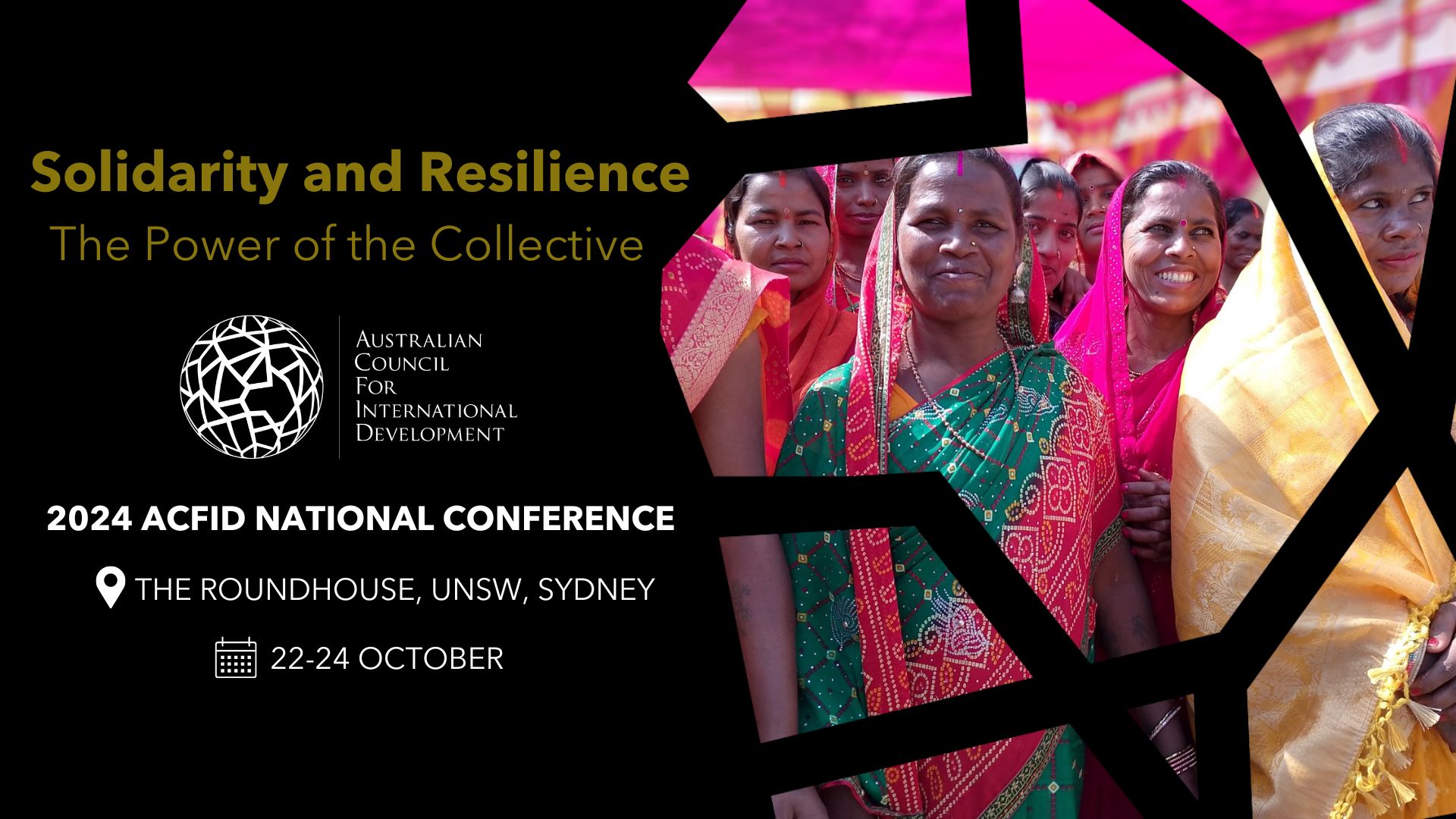ACFID National Conference 2024

Image
Malawi Thrive Story: Ireen celebrates with savings group members outside a World Vision community centre in Malawi. Photo: Jon Warren / World Vision.
Solidarity and Resilience
The power of the collective
The past few years have seen a convergence of crises across health, social, economic, and environmental domains. From the COVID-19 pandemic to climate change, geopolitical instability, and increasing pressures on civic space, these crises have highlighted the interconnectedness of global challenges and the need for empathy, collective action and innovative responses. Now more than ever, fostering solidarity and resilience is essential for promoting sustainable development and creating a more equitable and just world.
Solidarity is a fundamental principle in international development, recognizing our common humanity and the interconnectedness of our destinies[1]. It emphasizes the importance of a collective response to complex global issues, encouraging collaboration, resource-sharing, and the exchange of knowledge and expertise. The 2023 State of Civil Society Report by CIVICUS[2] highlighted the valuable and increasing role that small, informal grassroots groups, often formed and led by women, young people and Indigenous people are playing in driving social change. By championing and amplifying local movements and mechanisms, solidarity can strengthen civil society. But solidarity requires more than just passive support; it demands active engagement and at times surrendering our power and privilege.
Solidarity can play a critical role in promoting resilience in the face of global crises and efforts towards greater equality and justice. Resilience is a widely-used concept in international development, although it is not without its critiques. Most commonly resilience refers to the capacity of individuals, communities, and societies to anticipate, adapt to, and recover from shocks and stresses. In the face of challenges such as natural disasters, conflicts, shrinking civic space and economic and health crises, resilience is critical. It goes beyond mere survival; it involves the ability to bounce back, learn from adversity, and build better structures and systems for the future.
However, the concept and language of ‘resilience’ in international development has also faced critiques and has many interpretations[3]. At times the focus on resilience can shift the focus away from addressing the underlying structural issues perpetuating poverty and inequality. Is there a risk that in focusing on resilience, we simply maintain the status quo and broken systems rather than seeking transformational change?
Join us at the ACFID Conference 2024 to explore the transformative potential of solidarity and resilience in the face of unprecedented global challenges. Together, we can build a more sustainable, equitable, and just world.
22 Oct 24
Pre-Conference events.
Stay tuned for masterclass options.
23 Oct 24
Drawing on examples of successful solidarity-driven initiatives globally, Day 1 of ACFID Conference will invite us to reflect on the possibilities for strengthening solidarity to address complex challenges.
24 Oct 24
Exploring the concept of resilience and how we can work collectively to respond to and overcome the complex and compounding challenges facing the global community.
Concurrent Sessions Expressions of Interest NOW OPEN!!!
Looking to submit an EOI for this year’s conference? Please read through the information pack here.
When ready, use this form to submit your EOI
Closing 12 July 2024
Save the Dates
22, 23 and 24th October 2024
[1] United Nations Dept of Economic and Social Affairs, https://www.un.org/en/desa/international-human-solidarity-day-call-unity-and-action
[2] CIVICUS, 2023 State of Civil Society Report, https://www.civicus.org/index.php/state-of-civil-society-report-2023
[3] PSJP, Impact Trust, TrustAfrica and Global Greengrants Fund, UK. (2022). Understanding Resilience in International Development, https://globalfundcommunityfoundations.org/wpcontent/uploads/2022/08/UnderstandingResilience.pdf



